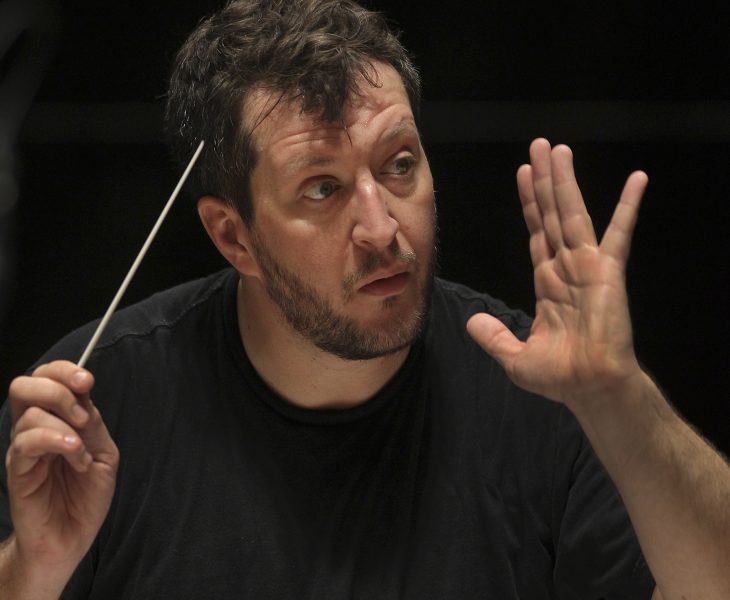Blue Gadoo is one of those cats whose face looks like it’s been bashed flat with a wok. He lives in New York, apparently, and his bulging eyes goggle out from Gerald Barry’s programme note for his new Organ Concerto. Check him out: the Guardian published the full note a day before the performance, which is only right because a Gerald Barry world première really ought to be national news. ‘I saw a photograph of him with a book called Sex and the Sacred in Wagner’s Tristan und Isolde,’ explains Barry. ‘By his expression I knew he was mourning the loss of atonality.’
There’s heaps more like that. Some of it offers a genuine insight into Barry’s new concerto — his boyhood experiences with a wheezing church harmonium in rural County Clare, embodied here in a harrumphing harmonium solo; and the way the chime of the Angelus would silence the daily routine just as it opens out a sudden, pregnant gap in the centre of the music. But there’s plenty that reeks of red herring. Barry just isn’t the sort of composer to admit that a cadenza for 21 metronomes embedded in the orchestra is a homage to Ligeti’s Poème symphonique, though he probably would concede that he takes a goofy, childish delight in starting a scale at the bottom of the double basses, then running it up through the orchestra to the piccolo, where the organ tops it off at bat-squeak frequency.
You either love this stuff, or find it intolerably arch. ‘Gerald Barry hates music!’ declared a colleague of mine once. Personally I suspect that Barry’s achievement — harder won than he’d let you think — is to love music at a more instinctive level than many of us can really credit. The faux-innocence is often beguiling — think of the duet for crash cymbals. And who else would make a timpanist play a full diatonic scale on instruments that are designed to produce no more than one pitch at a time? If you’re wondering about the organ, meanwhile, the concerto opens with a series of brusque, knotted exchanges for organ and brass which eventually swell into a huge agglomeration of sound that hangs, wobbling, above the audience. After that, Barry simply finds more interesting things to do. The organist Thomas Trotter handled it all with poker-faced aplomb, as far as one could tell when he was sitting with his back to the audience, two storeys above the orchestra. The whole thing ended with a muddy, trumpet-topped chorale, which Barry says is a hymn called ‘Humiliated and Insulted’. But then, he would.
Thomas Adès, who conducted, is a friend of Barry’s, and together with Britten’s Sinfonia da Requiem and Stravinsky’s Symphony in Three Movements the programme added up to a more meaningful commentary on Adès’s own Polaris (2010) than his actual words. The City of Birmingham Symphony Orchestra responded with flashing brilliance, and with brass choirs placed high around Symphony Hall Polaris resembled a vast, free-floating fanfare gradually coming to rest amid a crystal forest of brilliant orchestral sonorities. Even in these ideal conditions, however, you couldn’t avoid the suspicion — never the case with Barry — that Adès had made the mistake (first identified by Elgar) of using the orchestra, that ‘mighty engine’, at full power for too long and with too little respite.
The same goes for Anna Clyne’s This Midnight Hour, which received its UK première from the BBC Philharmonic in Manchester. Clyne is hugely listenable: her 2012 symphonic poem Night Ferry is a sort of maxi-minimalist reimagining of a Bax seascape, with a deep, churning undercurrent of romantic angst. In This Midnight Hour she cites an image from the Spanish poet Juan Ramon Jimenez: music as ‘a naked woman, running mad through the pure night’, and she begins in the same black-toned sonic vortex that launches Night Ferry before opening out into a rich lyrical melody that had the string players swaying. Everything about the piece — its oil-paint orchestration, its symphonic drive and its hyperreal sincerity — seemed to point towards a tonal peroration. But Clyne is far too much of a pro for that, and it fizzled out in a pallid duet for two trumpets, placed to no great effect at either side of the stage.
Certainly, Clyne’s ending paled beside the sheer emotional effrontery of Mahler’s First Symphony, which closed the concert. I’ve followed the conductor Ben Gernon since he was a teenager, so I was predisposed to enjoy his Mahler, and these are observations rather than judgments. First, it’s unusual to hear an orchestra with the BBC Phil’s reputation for machine-tooled precision run so exuberantly off the leash. Second: this is young man’s music, and I suspect this was just how Mahler imagined it — wide-eyed and glowing, with bits of leaf and twig tangled in its hair.





Comments